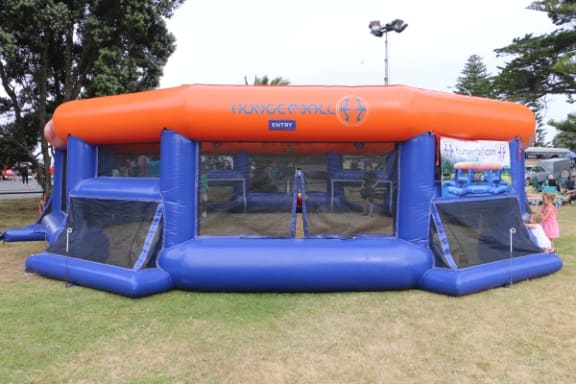This Way Up for Saturday 14 April 2018
This Way Up for Saturday 14 April 2018
Hungerball: a new flavour of football, Bits+Bytes: Facebook's privacy revelations and killer airbags: what you need to know.
Hungerball: a new flavour of football
Could a new version of football – developed in NZ and played in what looks like a circular bouncy castle – conquer the globe?
Psychologist Andu Iordache has high hopes for Hungerball, the game he came up with.
What makes the game unique is that it's played in an inflatable circular court.
Think of a clock, 10 metres in diameter with six goals around it at 12 o'clock, 2 o' clock, 4 o'clock, 6 o'clock, 8 o'clock and 10 o' clock.
The court is enclosed with netting to stop the ball from escaping. People defend their own goal and attack the other goals either individually or in teams.
Iordache is already exporting the game to Australia and Canada.and next month he takes it to England, the home of football.
We meet him at Rutherford College on the Te Atatu Peninsula west of Auckland to learn how the game works.
Bits+Bytes: Facebook's privacy revelations
How well did Facebook CEO Mark Zuckerberg handle probing questions from US lawmakers on Capitol Hill this week? Peter Griffin and the Privacy Commissioner John Edwards review what Mr Zuckerberg said, how he said it, and what it could mean for Facebook's business and for the future of data privacy.

Photo: (Photo by thoughtcatalog.com on Unsplash)
We also discuss the impact in New Zealand of new European privacy laws that come into force next month. The General Data Protection Regulation (or GDPR) make privacy and data protection a legal right, and from the end of May any organisation based in the EU, or anyone handling EU citizens' data or offering services or products in the EU, must comply with it.
With an overhaul of New Zealand's own privacy laws taking place, with public submissions on the Privacy Bill due to close on Thursday 24th May 2018, we look at which New Zealand businesses will potentially be subject to the GDPR and what they need to do to comply.
Plus concerns that the new US CLOUD Act erodes international data privacy.
Killer airbags: what you need to know
Faulty airbags are endangering the lives of New Zealand drivers and their passengers, part of a problem affecting 100 million cars worldwide.

Unlike these airbags, the faulty ones may explode rather than inflate. Photo: 123RF
A voluntary recall was announced in 2013, but according to the government, barely one-third of affected cars have so far had airbags replaced.
Last week, Commerce and Consumer Affairs Minister Kris Faafoi announced the compulsory recall of 50,000 vehicles fitted with Takata's most dangerous Alpha-type airbags.
Suppliers are required to contact owners and replace all the airbags no later than December 2019 or face penalties of up to $600,000.
A ban on the import of all new and used cars fitted with those airbags comes into force next month.
In the past week 250,000 people have visited the website set up to help consumers check if their car is one of those affected, and the recall has been widened to include more recent models.
Consumer head of testing Paul Smith says most of the airbags are in models manufactured from 2001 to 2006, but some are in models up to 2011.
Smith says more than 20 deaths and 200 injuries worldwide have been attributed to the airbags’ exploding rather than inflating.
“If you are part of this compulsory recall you will get a letter from the manufacturer to say take your car in and get the airbag replaced.
"But we think if you’re on list for the Alpha airbags you shouldn’t wait for a letter. You should contact them and say ‘I want this to be done’.”
Find out more:
Recall information from the Japanese government's website for used cars
Recall information for NZ new imports















